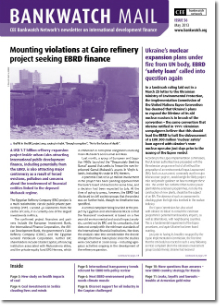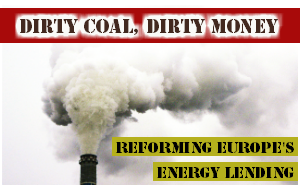EBRD Energy policy review – no more excuses, rhetoric or finessing

Bankwatch Mail | 10 May 2013
Energy is the watchword of the day, as we keep increasing the need for it, no matter the costs, apparently. Well, the costs do matter but they are distorted by subsidies old and new, for fossil fuels and for renewable energy sources, while the global business world is made to feel increasingly insecure by the price of carbon emissions.

This article is from Issue 56 of our quarterly newsletter Bankwatch Mail
Browse all articles on the right
Ultimately, this is blurring the contours of the central challenge: that we need to change our ways in many dirty sectors if we want climate action to be real, not just debate forever whether coal can still be a part of our lives or whether renewables can cover all of our needs. While generally the EU cannot be expected to interfere with member states’ energy choices, nonetheless it too often remains silent on projects that contradict its climate commitments, even at times putting its money into such projects.
In this context, especially with the EU’s 2030 and 2050 climate targets bearing down on it, the EBRD’s revision of its energy policy – now underway and running in parallel to the EIB’s review of its energy lending – is for sure an uncomfortable process for the bank. Not only does it have to balance the fact that its main – and original – region of operations, central and eastern Europe, is still endowed with substantial fossil fuel reserves, unlike the EIB – an institution owned by the EU that is squarely supposed to implement EU policies – the EBRD has an international shareholders’ structure. Yet for years we have heard from successive EBRD presidents that the countries of operation need to diversify their economies, most notably away from over-reliance on natural resources. Leading international bodies such as the International Energy Agency are also notably upping the ante by increasingly pointing out the climate change folly of continued support for fossil fuel extraction.

The EBRD and the EIB are currently reviewing their energy lending policies. We call for an end to coal subsidies.
Yet, from what has been seen so far in the early stages of the EBRD energy policy review, and aside from the pro-climate rhetoric, the EBRD appears set on being supine and detached from the climate policies and required action.
Over the past few years there have been some very welcome developments in the EBRD’s energy lending, such as a large increase in its energy efficiency and new renewables investments. However, this good news has been undercut by the bank’s continued financing of fossil fuels, which comprised almost half (48 percent) of its overall energy lending in the period 2006-2011. The EBRD cannot solve Europe’s shortage of clean energy finance by itself but it is not unreasonable to ask – why restrict its limited resources still further by continuing to plough them into coal power plant projects, among other fossil fuel follies?
Irrespective of EBRD actions, companies will continue to extract fossil fuels as long as the market allows it. The EBRD’s role, therefore, should be to contribute towards moving its countries of operations along the necessary transformative path, to the point where they are functional in a decarbonised world. Yet, as it looks toward the future and plans its part in the energy sector, the EBRD appears to be exploring support for – unbelievably – unconventional oil and gas.
With the new draft policy expected in June this year, the EBRD’s new energy policy needs to completely phase out investments into expansions of the fossil fuel sub-sectors, including extraction, transportation, storage and electricity generation and limit its investments in these carbon-intensive sectors only to energy efficiency or safety projects that neither increase the lifetime nor increase the capacity of such facilities.
This would mark a first small, yet giant, step towards a climate policy at the bank. It is called a ‘European’ bank, but it is not owned entirely by European states. It does not act in Europe alone. It is clearly not an EU institution. No matter – the decarbonisation agenda cannot be regional.
Read more
Our campaign page on the energy review gathers
data, demands and expert comments on energy lending and the need to end fossil fuel subsidies.
Theme: Energy & climate
Tags: BW Mail 56 | energypolicy
Never miss an update
We expose the risks of international public finance and bring critical updates from the ground. We believe that the billions of public money should work for people and the environment.
STAY INFORMED
